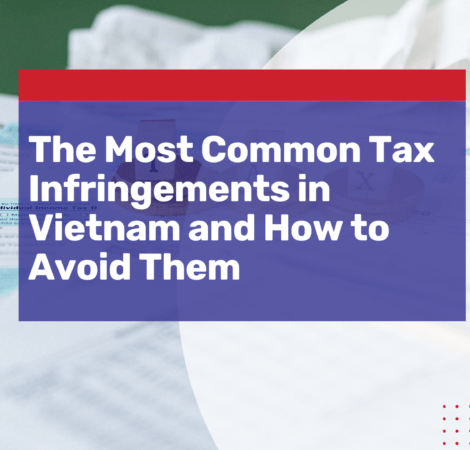Vietnamese tax law’s provisions are subject to yearly amendments. Therefore, tax infringements may occur if you are unaware of the changes.
Operating a successful business in Vietnam requires maintaining a seamless operation while avoiding government audits, inspections, and fines. This is heavily dependent on having competent tax professionals who are up to date with the latest regulations handling your taxes.
To assist you in getting started with your tax compliance, the Vietnam Department of Taxation has issued a list of the most frequent tax infractions.
Read More About InCorp’s Corporate Tax & Compliance Services for Foreign Firms
In this article, some of the checklist’s most essential items that affect foreign business owners are distilled. Continue reading to find out how to stop unintentional tax infringements in Vietnam and run your business smoothly.
Taxation in Vietnam: Common Tax Infringements Based on Industry

The most common tax violations are divided into tax category groups to make it easier for you.
Corporate Income Tax (CIT)
The federal and state governments levy a corporate income tax (CIT) on business profits. The standard CIT rate is 20%. However, CIT rates for oil and gas companies ranging from 32% to 50%, depending on the region and particular project requirements.
The most crucial tax infringement are also followed:
Fail to submit tax declaration:
- A warning will be issued if tax declaration dossiers are filed more than one day beyond the deadline but have valid justification.
- Tax declaration dossiers that are submitted beyond the deadline may incur fines ranging from VND 2,000,000 to VND 5,000,000
- A fee of between VND 5,000,000 and VND 8,000,000 will be charged if tax declaration dossiers are filed outside of the designated 31 to 60-day window.
Fail to submit a temporary tax declaration.
- Taxpayers who have paid less than the temporarily payable tax amount for the first three-quarters of the years must pay late payment interest calculated on the underpaid tax, starting the day after the deadline for the third-quarter temporary payment of corporate income tax and continuing until the date the amount of the unpaid tax is incorporated into the state budget.
- The following calculation is used to determine the amount for this tax infraction: 0.03% times the quantity of time and the amount of money needed.
Fail to submit a temporary tax declaration in the total amount.
- From the last day of the temporary corporate income tax payment deadline to the date, the remaining tax amount owing to the state budget deficit is paid, taxpayers who pay less than the temporarily payable tax amount are required to pay a late payment interest computed on the underpaid tax amount.
Fail to Audited Financial Statements
- Businesses must complete paying their Corporate Income Tax (CIT) obligations in full by the third month following the end of the fiscal or calendar year.
- If the company submits the audited financial statements after the deadline, it will face administrative penalties and be forced to make amends.
Tax evasion
Those who participate in tax evasion but not to the extent that it would result in legal repercussions will be subject to administrative sanctions. The executive sanction level is as follows as a result:
- A fine equal to the amount of tax that was evaded is imposed on taxpayers who committed one of the tax evasion acts listed above but had one or more mitigating circumstances.
- Without aggravating or mitigating circumstances, taxpayers who commit tax evasion are subject to a fine equal to 1.5 times the amount of the avoided tax.
- A fine equivalent to twice the avoided tax will be imposed on the taxpayer who commits one of the tax evasion crimes under aggravating conditions.
- A fine equal to 2.5 times the amount of tax that was evaded will be imposed on a taxpayer who commits one of the tax evasion crimes, and there are two aggravating circumstances.
- The penalty is three times the amount of tax evaded for taxpayers who engage in one of the tax evasion actions with three or more aggravating factors.
False declaration
- A fine between VND 500,000 and VND 1,500,000 will be assessed for false or incomplete disclosures of items unrelated to assessing tax liabilities in the tax dossier.
- A fine between VND 1,500,000 and VND 2,500,000 will be assessed for false or incomplete disclosures of the tax declaration criteria and the appendices attached to the tax declaration but have no bearing on the assessment of tax liabilities.
- For only complete or accurate disclosures of the criteria used to calculate tax obligations in tax dossiers, a fine ranging from VND 5,000,000 to VND 8,000,000 shall be impose Transfer pricing
Transfer pricing
- It happens when a company adjusts the pricing for goods or services exchanged amongst connected companies in different tax jurisdictions to pay less in taxes. The tax authorities in Vietnam keep a close eye on all transactions involving transfer pricing and will impose fines and penalties for violations.
Fail to submit tax declaration on time
- Organizational taxpayers that violate the tax code are subject to a maximum penalty of VND 200,000,000
- An individual taxpayer who violates tax laws can be fined up to VND 100,000,000
Value-Added Tax Infringements
- It is a generic consumption tax based on the value of the commodities and services produced, distributed, and consumed.
- The VAT rate for goods and services in 2022 was 10%. Telecommunications, information technology, banking, securities, finance, insurance, real estate trading, metal, prefabricated goods, cokes, refined petroleum, chemical products, mining products (apart from coal mining), and excise tax-exempt services are all included. The following are the most significant tax infractions:
Fail to submit tax declaration:
- A warning will be sent if tax declaration dossiers are filed more than one day beyond the due date and mitigating circumstances exist.
- Tax declaration dossiers that are submitted beyond the deadline may incur fines ranging from VND 2,000,000 to VND 5,000,000
- A fine between VND 5,000,000 and VND 8,000,000 will be assessed if tax declaration dossiers are filed after the allotted 31 to the 60-day timeframe.
Fail to submit a temporary tax declaration
- Taxpayers who have paid less than the temporarily payable tax amount for the first three-quarters of the years must pay late payment interest calculated on the underpaid tax, starting the day after the deadline for the third-quarter temporary payment of corporate income tax and continuing until the date the amount of the unpaid tax is incorporated into the state budget.
- The method for calculating the amount for this tax infringement is as follows: 0.03% x the number of days x the needed sum of money.
Fail to submit a temporary tax declaration in the total amount
- From the last day of the temporary corporate income tax payment deadline to the day, the remaining tax amount owing to the state budget deficit is paid, taxpayers who pay less than the temporarily payable tax amount are required to pay a late payment interest computed on the underpaid tax amount.
Fail to produce the balance sheet
- Businesses must disclose and pay any Corporate Income Tax (CIT) due by the third month after the conclusion of the fiscal year or calendar year. If the business submits the balance sheet beyond the due date, it will face administrative penalties and be forced to make amends.
Tax evasion
Those who participate in tax evasion but not to the extent that it would result in legal consequences will be subject to administrative punishment. The administrative punishment level is as follows:
- A fine equal to the amount of tax that was evaded is imposed on taxpayers who committed one of the tax evasion acts but had one or more mitigating circumstances.
- Without aggravating or mitigating circumstances, taxpayers who commit evasion are subject to a fine equal to 1.5 times the amount of tax that was evaded.
- A fine equivalent to twice the evaded tax will be imposed on the taxpayer who commits one of the tax evasion crimes under aggravating conditions.
- A fine equal to 2.5 times the amount of tax that was evaded will be imposed on taxpayers who commit tax evasion crimes, and there are two aggravating circumstances.
- A fine of three times the amount of tax evaded for taxpayers who engage in one of the evasion actions with three or more aggravating factors.
Producing invoices with false dates
- A fine for VND 3-5 million: A warning is the least severe penalty for billing at the wrong time. If an invoice is delivered after the due date but does not delay the payment of taxes and there are extenuating circumstances, the company will be fined and warned.
- A VND 4-8 million fine: For producing invoices at the wrong time and violating the legislation on invoicing for the sale of goods and the performance of services.
- A VND 10-20 million fine: For failing to provide invoices while legally providing services or selling goods to consumers.
Misbilling
- Refers to invoicing or reporting financial transactions dishonestly or falsely so that taxes are partially or fully paid.
- Let’s say a company is in the wrong sector of the economy. A fine between VND 1,000,000 and VND 5,000,000 will be enforced if the business operates in the incorrect location or sells faulty goods, as mentioned in the business registration document.
Continue reading: How Do You Calculate Your Foreign Contractor Tax in Vietnam?
Conclusion
In conclusion, the best way for businesses to avoid tax infringements and fines is to hire skilled tax specialists to advise and handle your taxes. You may reduce the likelihood of errors by using your competent tax specialists, trained to notice any errors and anomalies on tax forms. Also, tax professionals can help you find and claim all the tax credits and deductions you are eligible for, saving you money on your tax obligations. Another advantage tax specialists may offer businesses is developing a tax planning strategy tailored to your specific financial situation.
About Us
InCorp Vietnam is a leading provider of global market entry services. We are part of InCorp group, a regional leader in corporate solutions, that encompasses 8 countries in Asia-Pacific, headquartered in Singapore. With over 1,100 legal experts serving over 15,000 Corporate Clients across the region, our expertise speaks for itself. We provide transparent legal consulting, setup, and advice based on local requirements to make your business perfectly fit into the market with healthy growth.
Don’t take our word for it. Read some reviews from some of our clients.
